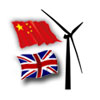 The head of the UK Ministry of Defence’s Cyber Security Program says that targeted attacks have already caused the premature demise of a UK wind turbine maker, and has cost the country $43 billion in lost economic growth already.
The head of the UK Ministry of Defence’s Cyber Security Program says that targeted attacks have already caused the premature demise of a UK wind turbine maker, and has cost the country $43 billion in lost economic growth already.
In an interview with The Telegraph, Major Gen Shaw said that a firm that had developed a revolutionary design for wind turbine blades in Warrington, Cheshire was forced out of business after hackers stole the company’s blueprint for the blade and produced a cheaper version of it overseas.
Shaw told the Telegraph that China poses the biggest threat to UK firms, and that attacks linked to China regularly target both private and public sector institutions in search of sensitive information.
Attacks from China are a persistent problem for government agencies and private sector firms in the U.S., as well. There have been persistent reports in recent years of attempts to compromise the infrastructure of high-profile technology and industrial firms. Often, suspicion has focused on elements within China, though attribution for the attacks is difficult.
The Chinese government accidentally released a film showing a soldier for the People’s Liberation Army (PLA) using a custom cyber attack tool to compromise a Web site belonging to Falun Gong, a persecuted spiritual group within China.
The country is also known to use trusted insiders – often Chinese nationals, or U.S. citizens with family in mainland China, as moles who can extract sensitive data from private and public sector organizations. In one incident in July, the Chicago Mercantile Exchange attempted to pass “thousands of files” containing source code and proprietary algorithms used to run trading systems to officials in China.
In the UK, an upcoming private-public Conference on Cyberspace on November 1st and 2nd to try to reach consensus on online security. The problem has the attention of the Obama administration, which has increased funding for cyber- initiatives, created an integrated U.S. Cyber Command within the military and, most recently, issued an executive order designed to limit access to classified networks and data.









